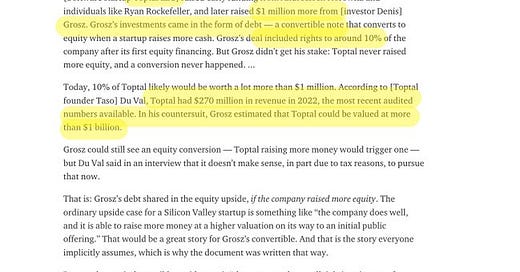Welcome back.
This newsletter edition spotlights a few topical issues related to every high-growth tech startup. Here’s what to expect:
When SAFEs are not safe
Interesting reads
Ecosystem update
When SAFEs are not safe
In 2012, the founder of a global talent marketplace raised $1.5m from notable VCs in Silicon Valley, including a16z. Investors were optimistic about the startup’s prospects and expected an outsized return on their investment. Employees were promised equity — ESOP.
But stakeholders involved were in for a rude shock.
Unlike the average startup that ends up failing, Toptal is a remarkable startup that connects businesses with global talents around the world. They raked in about $270m in annual revenue in 2022 — valued at more than $1B. Despite the contractual arrangements to grant equity to early employees, including co-founder and investors, Du Va, CEO of Toptal, owns 100% of the Toptal.
As of the time of this post, a16z and other investors' stake is about 15%. Yet, no return on investment. Why and how is this possible?
First, a quick primer on SAFEs.
Y Combinator introduced the Simple Agreement for Future Equity (SAFE) in 2013. It is a novel financial instrument that allows early-stage companies to defer valuation and combines the advantages of Convertible Notes (debt) with equity finance for immediate funds while postponing valuation until a later funding round, usually Series A.
In Toptal’s case, a16z and other stakeholders got involved with Toptal in 2012 before the SAFE officially was introduced. So investors invested through “convertible notes” which would grant them equity only if Toptal raised additional funds in the future. Meanwhile, Du Val, CEO of Toptal, ousted his cofounder and didn’t raise money after the initial seed round, meaning he does not “owe” anyone equity in Toptal.
Du Val maintains that he has no obligation to grant equity, arguing that it was a smart move not to raise more funds. The business is profitable and a contract is a contract. To date, investors do not receive dividends or equity due to the absence of subsequent equity financing rounds. Employees feel misled into believing more funds would be raised which will trigger a liquidity event — Secondaries.
According to the contractual agreement, Toptal employees and investors have no recourse other than directly requesting their money back or pursuing legal action against Du Val. All stakeholders have tried both options but to no avail.
Like every amazing thing, SAFE notes have a flaw: if a company does not raise subsequent rounds after its initial VC funding, the SAFE will not convert. This flaw legally permits profitable startups to avoid equity financings to maintain control and founders may prioritize personal gain over stakeholders' interests.
SAFE notes fundamental flaws are twofold:
Limited Conversion Rights: SAFEs convert to equity only during equity financing, sale, public listing, dissolution, or other exit scenarios.
Absence of Control Mechanisms: SAFEs lack fiduciary obligations or stock veto rights, leaving investors unable to prevent founders from actions such as taking excessive salaries, issuing multiple SAFEs, or obscuring company financials.
Startup lawyers who have identified flaws in the SAFE document propose a few amendments such as:
Use SAFEs only for high-growth, pre-seed startups.
Include a long-term maturity backstop date with a payback premium or forced conversion into Series Seed (e.g., if no equity financing or exit occurs within 5-10 years, the SAFE converts or is paid back at the SAFE holder's option).
Add key control provisions in a side letter, such as limits on executive compensation over $X, convertible financings over $Y, and debt financings.
To be clear, SAFEs are not going to change anytime soon. And pulling a Du Val stunt on VCs and employees will be an uphill task for anyone in 2024.
Not everything legal is considered ethical (case in point - Du Val & Toptal). There are many takeaways from this story. Above all, ensure you read contracts and agreement documents. Get a legal pair of eyes to look through those documents. Where clauses are ambiguous, ask clarifying questions.
Interesting reads
Ecosystem updates
Flutterwave has partnered with Nigeria's Economic and Financial Crimes Commission (EFCC) to set up a Cybercrime Research Centre.
Data breach: Anyone can buy a Nigerian's identity (NIN, BVN) for ₦190.
Until next time,
Keep building.
Offiong
Sign up for Opentraction, our newsletter where we share actionable insights and real-world advice from founders & operators who are building venture-backed startups in Africa
🚀 Have or know a tech product we should be aware of? Let’s talk
💰 Are you a founder of a startup? Apply for funding
💭 Just want to give us feedback? Please reach out
🐦 Don’t want to miss Microtraction news, updates? Subscribe.




